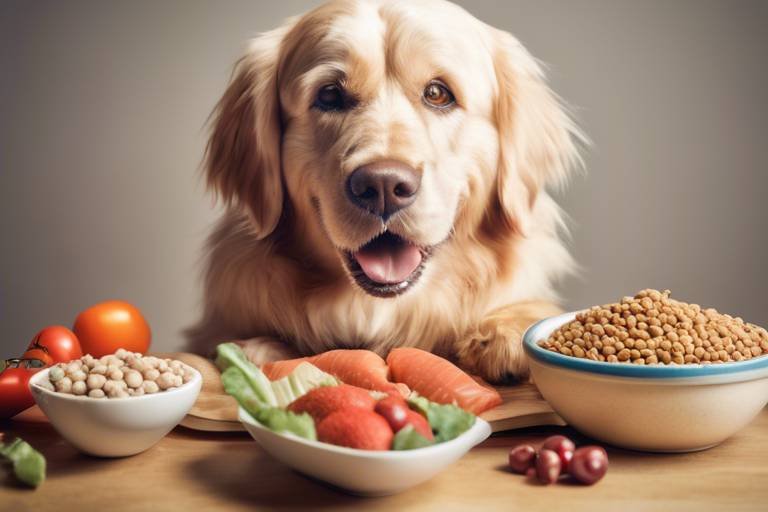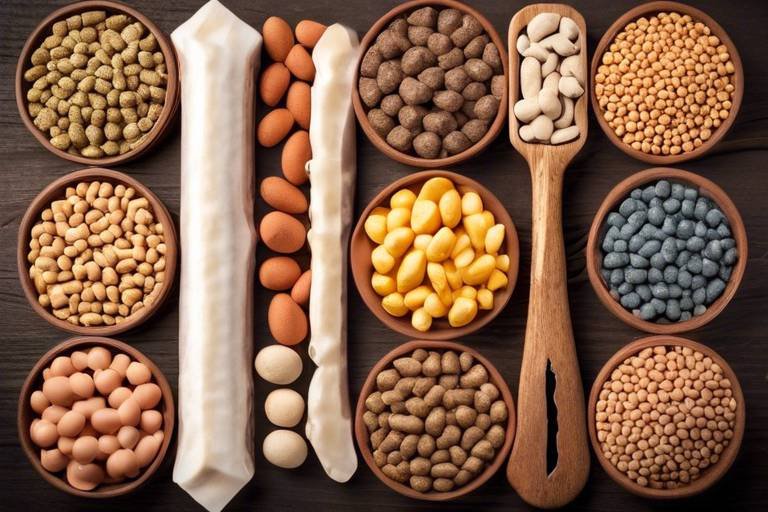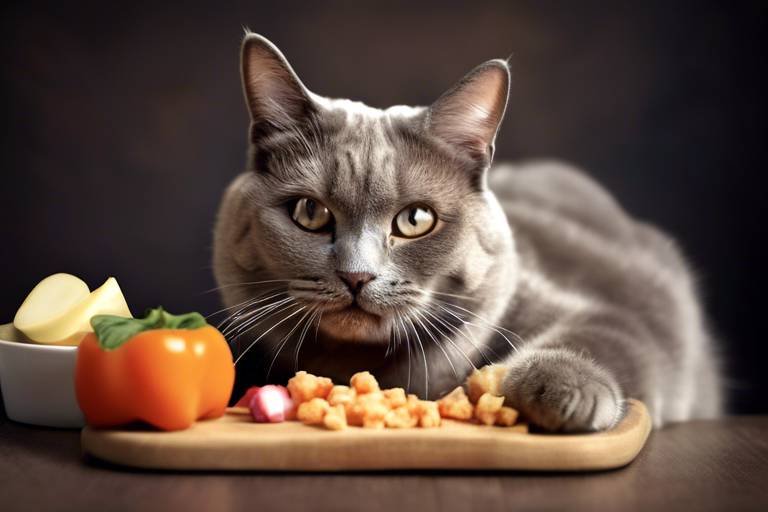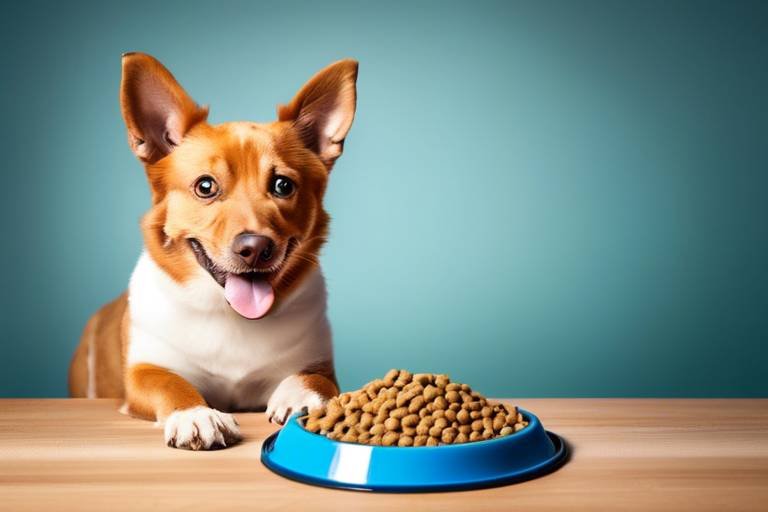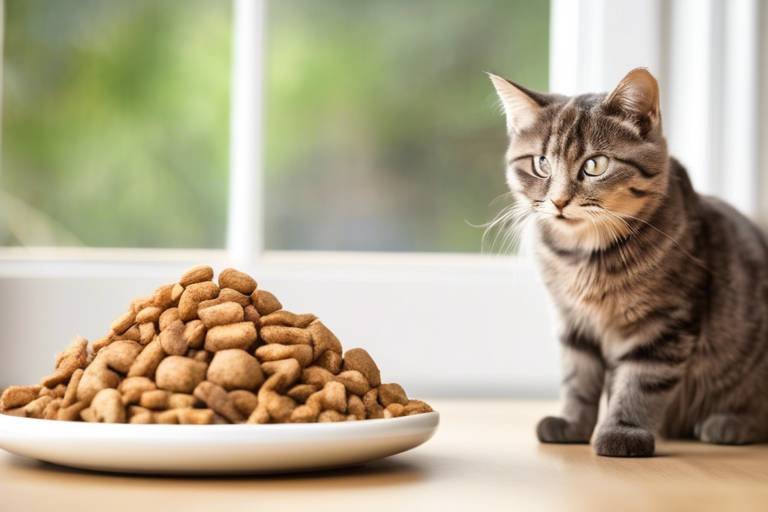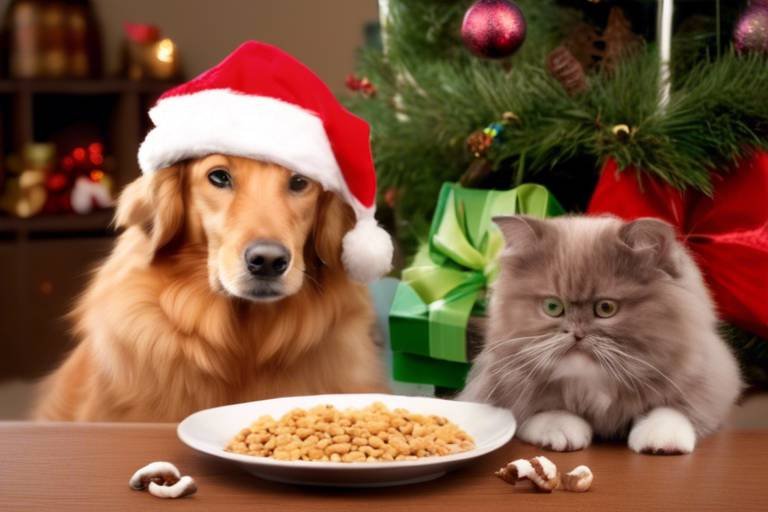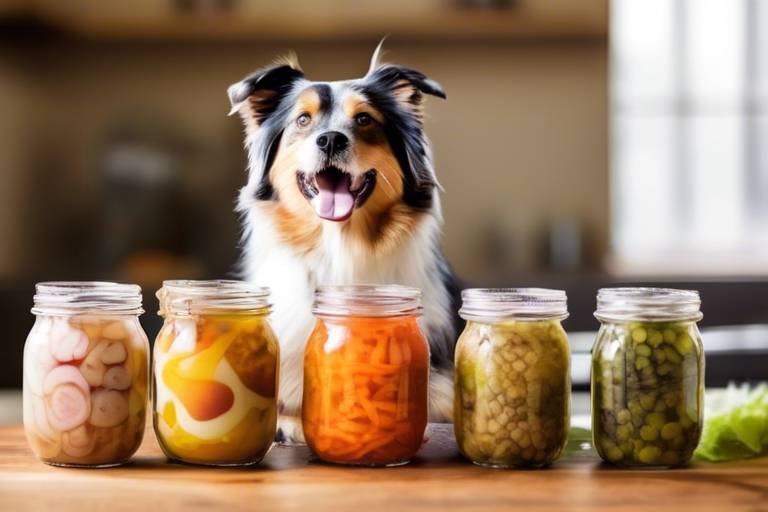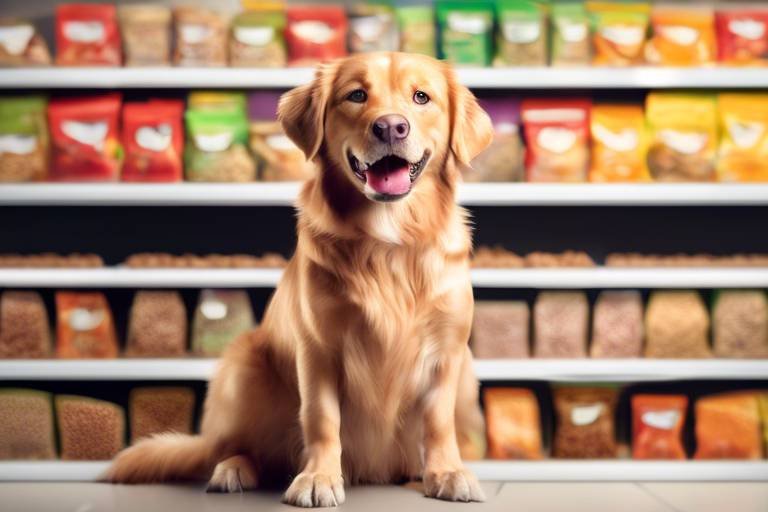The Role of Pet Nutrition in Longevity
When you think about your pet's health and happiness, nutrition might not be the first thing that comes to mind, but it should be! Just like us, our furry friends thrive on a balanced and nutritious diet that can significantly impact their lifespan and overall well-being. Imagine feeding your dog or cat the right food as planting a seed; with proper care and attention, that seed can grow into a robust and flourishing tree. In this article, we will explore how proper nutrition plays a pivotal role in enhancing the longevity of our beloved pets, focusing on essential dietary components, feeding practices, and how nutrition influences pets at various life stages.
A balanced diet is not just a trendy phrase; it is a fundamental aspect of your pet's health. Just like humans, pets require a variety of nutrients to function optimally. A well-rounded diet provides essential nutrients that support overall health, boost immunity, and promote longevity. Think of it as building a strong foundation for a house—without it, everything else is at risk of collapsing. Understanding the components of a balanced diet can help pet owners make informed choices that lead to a happier, healthier life for their pets.
In the quest for a longer life for our pets, certain nutrients emerge as heroes. These vital components play a significant role in promoting longevity and maintaining a healthy, active lifestyle. Let’s dive into the key players:
Proteins are the building blocks of life, essential for growth, repair, and maintenance of body tissues. They are crucial for muscle development and immune function, ensuring that your pet stays lively and energetic. High-quality protein sources include:
- Chicken
- Fish
- Beef
- Eggs
By incorporating these protein-rich foods into your pet's diet, you can help them build and maintain strong muscles and tissues, ultimately contributing to their longevity.
Fats are often misunderstood, yet they are a concentrated energy source for pets and are necessary for cellular function. They support brain health and help absorb fat-soluble vitamins. It's essential to choose healthy fats, such as those found in fish oil and flaxseed oil, to provide your pet with the energy they need to play and explore. Think of fats as the fuel that keeps your pet's engine running smoothly!
Vitamins and minerals are like the tiny gears in a well-oiled machine, crucial for various bodily functions. They help with everything from bone health to immune response. Important vitamins include:
- Vitamin A for vision and skin health
- Vitamin D for calcium absorption
- Vitamin E for antioxidant protection
Minerals such as calcium and phosphorus are also essential for strong bones and teeth. Ensuring your pet's diet is rich in these nutrients can significantly impact their health and longevity.
Fiber is often overlooked in pet diets, yet it plays a significant role in digestion and weight management. It helps regulate blood sugar levels and keeps your pet feeling full, which is crucial for preventing obesity. Incorporating fiber-rich foods, such as sweet potatoes and pumpkin, can aid in digestion and promote a healthy gut, ensuring your pet remains active and vibrant.
Just as we have different dietary needs at various stages of life, our pets do too! From the energetic puppy or kitten to the wise senior dog or cat, understanding these changing nutritional requirements is vital for promoting longevity.
Young pets require specific nutrients for growth and development. They need a diet rich in proteins, fats, and essential vitamins to support their rapid growth. Feeding them high-quality puppy or kitten food ensures they get the right balance of nutrients to thrive during their formative years.
As pets age, their nutritional needs evolve. Adult pets may require fewer calories but more fiber to prevent obesity, while senior pets often benefit from diets that support joint health and cognitive function. Tailoring diets for adult and senior pets can address common health issues and promote longevity, ensuring they enjoy their golden years to the fullest.
Beyond nutrient content, feeding practices significantly impact pet health. Establishing a consistent feeding schedule and understanding portion sizes are crucial for maintaining a healthy weight. Additionally, hydration is often underestimated but is vital for overall health. Ensuring your pet has access to fresh water at all times can greatly contribute to their longevity and well-being.
Overfeeding can lead to obesity and related health issues. Portion control is essential! It’s like managing a budget—too much spending can lead to debt, just like too much food can lead to health problems. To determine the right amounts for your pets, consult your veterinarian and pay attention to your pet’s weight and activity level.
Did you know that adequate hydration is essential for overall health? Just like us, pets require water to maintain their bodily functions. Proper hydration helps with digestion, nutrient absorption, and even temperature regulation. Make sure your pet has access to clean, fresh water every day to keep them healthy and happy!
Q: What are the best foods for my pet?
A: Look for high-quality pet foods that list real meat as the first ingredient and avoid fillers like corn and soy.
Q: How can I tell if my pet is overweight?
A: You should be able to feel your pet's ribs without excess fat covering and see a waist when viewed from above.
Q: How often should I feed my pet?
A: Most adult pets do well with two meals a day, while puppies and kittens may require more frequent feeding.
Q: Should I give my pet supplements?
A: Always consult your veterinarian before adding supplements to your pet's diet, as a balanced diet usually provides all necessary nutrients.
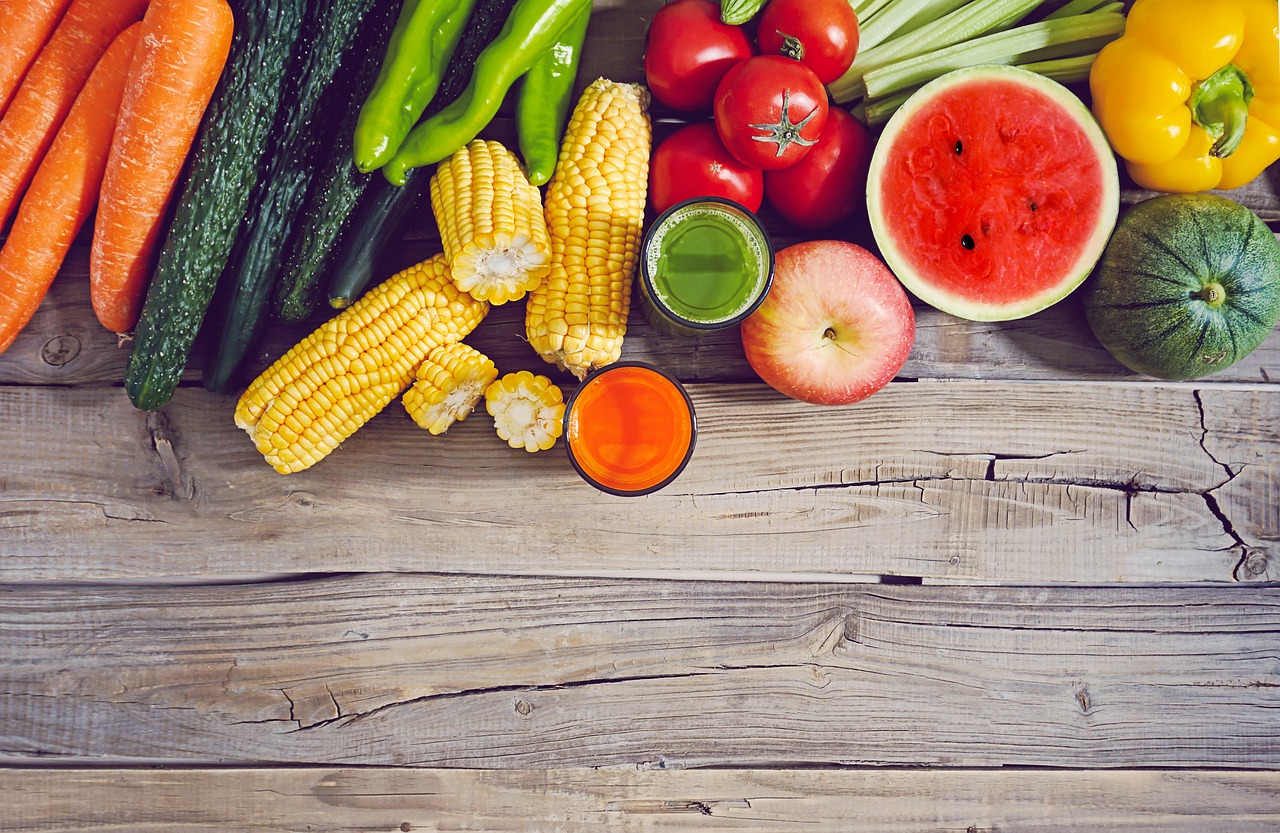
The Importance of Balanced Diets
A balanced diet is not just a buzzword; it's a vital foundation for your pet's health and longevity. Just like humans, pets require a variety of nutrients to thrive. Think of a balanced diet as a well-orchestrated symphony, where each nutrient plays its part to create harmony in your pet's body. If one instrument is out of tune, the entire performance suffers. Similarly, if your pet's diet lacks essential nutrients, it can lead to health issues that shorten their lifespan.
Understanding what constitutes a balanced diet is crucial for pet owners. It’s not just about filling their bowls with food; it’s about making informed choices that cater to their unique needs. A balanced diet typically includes a mix of proteins, fats, carbohydrates, vitamins, and minerals. Each of these components contributes to different aspects of health. For instance, proteins are essential for growth and repair, while fats provide energy and support cellular functions. Carbohydrates can offer quick energy, and vitamins and minerals are necessary for various bodily functions.
When you look at your pet's food label, it might seem overwhelming with all the ingredients listed. But don't fret! Here’s a quick breakdown of what you should look for:
| Nutrient | Function | Sources |
|---|---|---|
| Proteins | Growth and tissue repair | Meat, fish, eggs |
| Fats | Energy and cell function | Fish oil, chicken fat |
| Carbohydrates | Quick energy | Grains, vegetables |
| Vitamins | Metabolic functions | Fruits, vegetables |
| Minerals | Bodily functions | Meat, bones, supplements |
It's essential to remember that not all pet foods are created equal. Some may contain fillers that offer little nutritional value. Always opt for high-quality brands that prioritize natural ingredients. If you're unsure, consult with a veterinarian who can guide you in choosing the right diet for your furry friend.
In summary, a balanced diet is the cornerstone of your pet's health. It supports their immune system, promotes healthy growth, and can even prevent chronic diseases. By being mindful of what you feed your pet, you’re investing in their longevity and overall well-being. So, the next time you fill their bowl, think about the symphony of nutrients that will keep them happy and healthy for years to come!
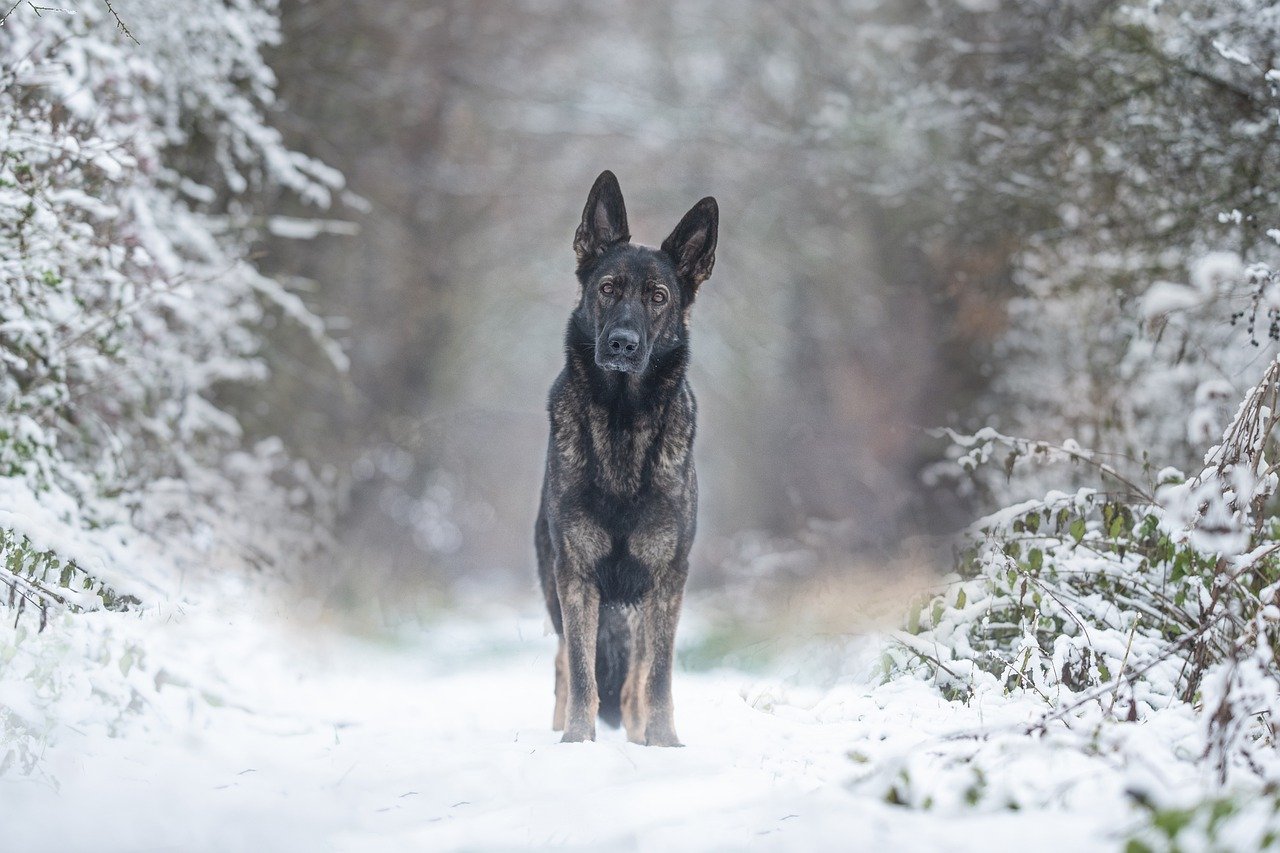
When it comes to ensuring our furry friends live long, healthy lives, nutrition is the cornerstone of their well-being. Just like us, pets require a variety of nutrients to thrive, and understanding these key components can make all the difference in their longevity. Think of their diet as a well-balanced orchestra; every nutrient plays a vital role in creating a harmonious symphony of health. So, what are these essential nutrients that contribute to a pet's lifespan?
First up, we have proteins. These are the building blocks of life, crucial for growth, tissue repair, and overall maintenance of the body. High-quality proteins, sourced from meats, fish, and certain plant-based options, provide amino acids that help in muscle development and immune function. Imagine proteins as the construction workers of your pet's body, tirelessly repairing and building new cells to keep everything running smoothly.
Next, let’s talk about fats. Often misunderstood, fats are not the enemy! In fact, they are a concentrated source of energy and are essential for many bodily functions, including cellular structure and nutrient absorption. There are healthy fats, like omega-3 and omega-6 fatty acids, which can be found in fish oils and flaxseed. Think of fats as the fuel that keeps your pet's engine running, providing the energy they need to play, explore, and live life to the fullest.
Now, we can't forget about vitamins and minerals. These micronutrients are vital for various bodily functions, from maintaining a strong immune system to ensuring proper bone health. For instance, vitamin E acts as an antioxidant, while calcium is crucial for strong bones. A deficiency in these nutrients can lead to serious health issues. It's like trying to drive a car without oil; eventually, something’s going to give. Providing a balanced diet rich in these vitamins and minerals is essential for keeping your pet in tip-top shape.
Another often-overlooked component of a pet's diet is fiber. This nutrient is key for maintaining digestive health and managing weight. Fiber-rich foods, such as certain vegetables and whole grains, help regulate bowel movements and can prevent obesity by promoting a feeling of fullness. Think of fiber as the broom that sweeps through your pet's digestive system, keeping everything clean and running smoothly.
In summary, the right balance of proteins, fats, vitamins, minerals, and fiber is crucial for your pet's longevity. By ensuring that their diet is rich in these nutrients, you're not just feeding them; you're investing in their health and happiness for years to come. Remember, a well-nourished pet is a happy pet!
- What are the best protein sources for pets? High-quality meats, fish, and eggs are excellent sources of protein for pets.
- How can I ensure my pet gets enough vitamins and minerals? A balanced diet with commercial pet food that meets AAFCO standards typically provides adequate vitamins and minerals.
- Is it necessary to add fiber to my pet's diet? Yes, fiber is important for digestion and can help prevent obesity.
- How do I know if I'm feeding my pet the right amount? Consult your veterinarian for specific recommendations based on your pet's age, weight, and activity level.
When it comes to your furry friend's health, proteins are the unsung heroes. Think of proteins as the building blocks of life; they are essential for growth, repair, and maintenance of body tissues. Just like how a sturdy foundation is crucial for a house, proteins provide the necessary support for your pet's body to function optimally. They help in building muscles, producing enzymes, and even supporting a healthy immune system. Without adequate protein, your pet may struggle with various health issues, including muscle wasting and a weakened immune response.
So, what are the best sources of protein for your pets? Well, high-quality proteins come from both animal and plant sources. Animal proteins, such as chicken, beef, fish, and eggs, are considered complete proteins because they contain all the essential amino acids your pet needs. On the other hand, plant-based proteins, like lentils and peas, can also be beneficial, especially when combined with animal proteins to create a balanced diet. It's essential to choose protein sources that are easy for your pet to digest and absorb.
Here’s a quick look at some common protein sources and their benefits:
| Protein Source | Benefits |
|---|---|
| Chicken | High in protein, easy to digest, and rich in essential amino acids. |
| Beef | Rich in iron and zinc, supports muscle development. |
| Fish | Contains omega-3 fatty acids, promoting healthy skin and coat. |
| Eggs | Excellent protein source with high bioavailability, packed with vitamins. |
Incorporating these protein sources into your pet's diet can lead to noticeable improvements in their overall health. You might see your dog running around with more energy or your cat's coat becoming shinier and healthier. Remember, though, that moderation is key! Too much protein can lead to health complications, so it’s essential to consult with your veterinarian to determine the right amount of protein for your pet's specific needs.
Ultimately, ensuring your pet receives adequate protein is a vital aspect of their nutrition that can significantly affect their longevity and quality of life. Just like we need a balanced diet to thrive, so do our beloved pets. So, let’s make sure they get their protein fix!
When it comes to your pet's diet, fats are often misunderstood. Many pet owners might think of fat as something to avoid, but in reality, it is a crucial component of a healthy diet. Just like how we need a bit of fat to keep our energy levels up, pets also rely on fats for their overall health and vitality. They serve as a concentrated source of energy, providing more than double the calories per gram compared to proteins and carbohydrates. This makes fats essential, especially for active pets that require extra energy to fuel their playful antics.
But not all fats are created equal! There are different types of fats that play various roles in your pet's body. For instance, omega-3 and omega-6 fatty acids are types of polyunsaturated fats that are vital for maintaining a shiny coat, healthy skin, and even supporting brain function. These fatty acids cannot be produced by your pet's body, so they must be included in their diet. You can find these beneficial fats in sources like fish oil, flaxseed, and certain types of meat.
Moreover, fats are essential for the absorption of fat-soluble vitamins such as vitamins A, D, E, and K. Without adequate fat in their diet, pets may struggle to absorb these vitamins properly, leading to deficiencies that can affect their overall health. This is why a well-rounded diet that includes healthy fats is crucial for maintaining your pet's well-being.
To help you understand the importance of fats in your pet's diet, here's a quick overview of the different types of fats and their benefits:
| Type of Fat | Sources | Benefits |
|---|---|---|
| Saturated Fats | Animal fats, coconut oil | Provides energy, supports cell structure |
| Monounsaturated Fats | Olive oil, chicken fat | Good for heart health, helps reduce inflammation |
| Polyunsaturated Fats | Fish oil, flaxseed oil | Supports skin and coat health, reduces allergies |
It's important to choose high-quality fat sources for your pet. Always check the ingredient list on pet food labels to ensure that healthy fats are included. This can make a significant difference in your pet's energy levels and overall health. Remember, moderation is key; while fats are essential, too much can lead to obesity and other health issues. Aim for a balanced approach to your pet's diet, incorporating the right types of fats to keep them happy and healthy.
- What types of fats should I include in my pet's diet? Look for sources of omega-3 and omega-6 fatty acids, such as fish oil and flaxseed.
- Can my pet have too much fat in their diet? Yes, overfeeding fats can lead to obesity. Always consult your vet for personalized advice.
- How can I tell if my pet is getting enough healthy fats? A shiny coat and healthy skin are good indicators. If you notice issues, consult your veterinarian.
When it comes to our furry friends, vitamins and minerals are not just fancy words thrown around in pet food commercials. They are the unsung heroes that quietly work behind the scenes to keep our pets healthy and thriving. Just like humans, pets require a variety of these essential nutrients to support their bodily functions, maintain energy levels, and promote longevity. So, what exactly do these nutrients do, and why are they so important?
Vitamins are organic compounds that play crucial roles in metabolic processes. They help in everything from energy production to immune function. For instance, Vitamin A is essential for vision and skin health, while Vitamin D is vital for calcium absorption and bone health. On the other hand, minerals are inorganic elements that also serve various functions, such as building bones, transmitting nerve impulses, and maintaining hydration. Key minerals like calcium, phosphorus, and potassium are essential for a pet's overall well-being.
Here's a quick rundown of some important vitamins and minerals and their benefits:
| Nutrient | Benefits |
|---|---|
| Vitamin A | Supports vision, skin health, and immune function. |
| Vitamin D | Essential for calcium absorption and bone health. |
| Vitamin E | Acts as an antioxidant, protecting cells from damage. |
| Calcium | Crucial for strong bones and teeth. |
| Iron | Essential for blood production and oxygen transport. |
It's important to note that while vitamins and minerals are vital, they must be consumed in the right amounts. Too much of a good thing can lead to toxicity and health issues. For example, excessive Vitamin D can cause kidney damage, while too much calcium can lead to skeletal problems. Therefore, pet owners should always consult with a veterinarian to ensure their pets are receiving the correct balance of nutrients.
Incorporating a variety of whole foods into your pet's diet can help provide these essential vitamins and minerals. Think of it like a colorful plate of fruits and vegetables; the more variety, the better! Additionally, many commercial pet foods are fortified with these nutrients, making it easier for pet owners to ensure their pets are getting what they need.
In summary, vitamins and minerals are crucial for the health and longevity of our pets. By understanding their roles and ensuring our pets receive the right balance, we can help them lead long, healthy lives. After all, a well-nourished pet is a happy pet!
- What are the signs of vitamin deficiency in pets? Common signs may include lethargy, poor coat condition, and a weakened immune system.
- Can I give my pet human vitamins? It's best to consult your veterinarian before giving any supplements to your pet, as some human vitamins can be toxic to animals.
- How can I ensure my pet is getting a balanced diet? Consult with your veterinarian to create a tailored diet plan that meets your pet's specific nutritional needs.
When we think about pet nutrition, we often focus on the big players like proteins and fats, but fiber is a silent hero that deserves more attention. Just like how we need fiber in our diets for good digestion and overall health, our furry friends benefit from it too. Fiber is essential in helping maintain a healthy digestive system, which is crucial for your pet's well-being. It acts like a broom, sweeping through the intestines and ensuring everything is moving smoothly. Without adequate fiber, pets can experience various issues, including constipation and digestive discomfort.
One of the most significant benefits of fiber is its role in weight management. Many pets struggle with obesity, which can lead to serious health problems such as diabetes, joint issues, and heart disease. By incorporating fiber-rich foods into their diets, pet owners can help their pets feel fuller for longer periods, reducing the likelihood of overeating. It's like having a built-in portion control mechanism! Foods high in fiber can slow down the digestion process, allowing pets to enjoy their meals without the constant urge to snack.
Moreover, fiber can also help regulate blood sugar levels. For pets with diabetes or those at risk, a diet rich in fiber can slow the absorption of sugar into the bloodstream, leading to more stable energy levels and preventing those dreaded sugar spikes. This is particularly important for senior pets who may be more susceptible to metabolic issues. With fiber in the mix, you're not just feeding your pet; you're actively contributing to their long-term health.
But what exactly are some good sources of fiber for pets? Here’s a quick rundown:
- Vegetables: Carrots, green beans, and sweet potatoes are excellent choices.
- Fruits: Apples (without seeds), blueberries, and pumpkin are not only tasty but also packed with fiber.
- Whole grains: Brown rice and oats can be great additions to your pet's diet.
When introducing fiber into your pet's diet, it's essential to do so gradually. A sudden increase can lead to gas and upset stomachs, which is something we all want to avoid! Start with small amounts and monitor how your pet reacts. If they seem to handle it well, you can gradually increase the fiber content. Remember, balance is key. Too much fiber can also lead to issues like diarrhea, so finding the right amount is crucial.
In conclusion, fiber is an often-overlooked component of pet nutrition that plays a vital role in digestion, weight management, and overall health. By understanding the importance of fiber and incorporating it into your pet's diet, you can help ensure they lead a happy, healthy, and long life. So next time you're shopping for pet food, don't just look at the protein and fat content—check the fiber levels too!
- What types of fiber are best for pets? Both soluble and insoluble fiber are beneficial. Soluble fiber helps with digestion, while insoluble fiber aids in regulating bowel movements.
- Can too much fiber harm my pet? Yes, too much fiber can lead to digestive upset. Always introduce fiber gradually and consult your vet for personalized advice.
- Are there commercial pet foods that are high in fiber? Absolutely! Many brands offer high-fiber formulas specifically designed for weight management and digestive health.
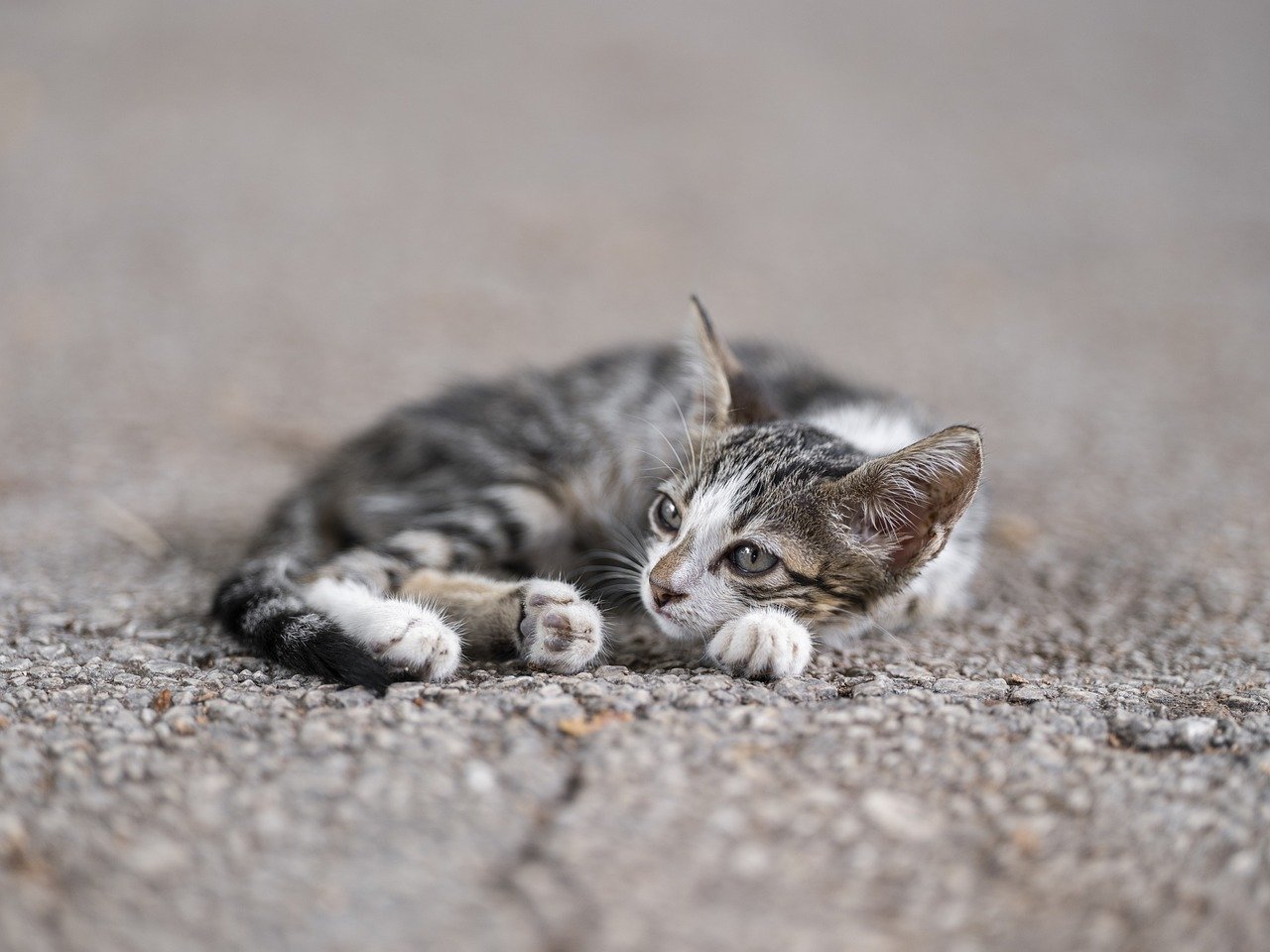
Just like humans, pets experience different nutritional needs as they journey through various life stages. From their playful puppy or kitten days to the wise and gentle senior years, the dietary requirements of our furry friends change significantly. Understanding these changes is crucial for any pet owner who wants to ensure their beloved companions live long, healthy lives. Imagine feeding a growing puppy the same way you would an elderly dog; it’s like expecting a toddler to eat the same meals as a teenager! Each stage of life brings unique challenges and needs, and a tailored diet can make all the difference.
During the puppy and kitten phase, pets require a diet rich in calories, proteins, and essential nutrients to support their rapid growth and development. High-quality protein sources are vital for building strong muscles and tissues. Additionally, certain fatty acids, such as Omega-3 and Omega-6, play a crucial role in brain development and overall health. To give you a clearer picture, here’s a quick overview of the essential nutrients needed during this stage:
| Nutrient | Importance |
|---|---|
| Proteins | Supports growth and muscle development |
| Fats | Provides energy and supports brain development |
| Vitamins | Boosts immune function and overall health |
| Minerals | Essential for bone growth and development |
As pets transition into adulthood, their nutritional needs shift once again. Adult pets require a balanced diet that maintains their health without leading to obesity. This is the time when portion control becomes essential. A diet rich in lean proteins, healthy fats, and fiber helps maintain a healthy weight and supports overall health. It’s important to monitor their activity levels and adjust their caloric intake accordingly. Have you ever seen a pet that seems to have a bottomless pit for a stomach? That’s where good judgment comes in!
When our pets reach their golden years, their dietary needs change yet again. Senior pets often face health issues such as arthritis, dental problems, and decreased metabolism. Therefore, it’s crucial to adapt their diets to include joint-supporting nutrients like glucosamine and chondroitin, as well as fibers that aid in digestion. Hydration also becomes more critical, as older pets may not drink enough water on their own. It’s a bit like caring for a wise old sage; you want to ensure they have everything they need to feel comfortable and vibrant in their twilight years.
In summary, understanding the nutritional needs of pets at various life stages is not just beneficial; it’s essential for their health and longevity. By adjusting their diets according to their age and health status, we can help our furry companions live their best lives. Remember, a well-fed pet is a happy pet!
- What are the signs of poor nutrition in pets? Look for symptoms like lethargy, poor coat condition, weight loss, or changes in behavior.
- How often should I feed my pet? It varies by age and size, but generally, puppies and kittens need more frequent meals than adults.
- Can I use human food for my pet's diet? Some human foods are safe, but many can be harmful. Always consult your vet before introducing new foods.
- How can I ensure my senior pet gets enough hydration? Provide fresh water daily and consider wet food options to increase moisture intake.
When it comes to the adorable little bundles of joy we call puppies and kittens, their nutritional needs are as unique as their personalities. These young pets are in a critical phase of growth and development, and the right diet can set the stage for a long, healthy life. Just like a seed needs the right soil to grow into a strong tree, puppies and kittens require a balanced diet rich in essential nutrients to flourish.
First off, let’s talk about proteins. These are the building blocks of life, crucial for the development of muscles, tissues, and organs. Puppies and kittens need a higher protein intake compared to adult pets, as they are rapidly growing. Look for high-quality protein sources such as chicken, lamb, or fish in their food. These proteins not only support growth but also aid in maintaining a robust immune system, which is vital for their long-term health.
Next up is fats. Yes, you heard that right! Healthy fats are not the enemy; in fact, they are an essential part of a young pet's diet. Fats provide concentrated energy, which is particularly important for active puppies and kittens. They also help in the absorption of fat-soluble vitamins, ensuring that your furry friend gets the most out of their food. Look for sources of omega-3 and omega-6 fatty acids, such as fish oil and flaxseed, which can promote a shiny coat and healthy skin.
Then, we have vitamins and minerals. These micronutrients play a pivotal role in various bodily functions, from bone development to immune health. For puppies and kittens, calcium and phosphorus are particularly important for bone growth and dental health. A well-rounded diet will typically include these minerals, but it’s essential to consult with your veterinarian to ensure your pet is getting the right amounts.
| Nutrient | Importance |
|---|---|
| Proteins | Supports growth and muscle development |
| Fats | Provides energy and aids in vitamin absorption |
| Vitamins | Essential for overall health and development |
| Minerals | Crucial for bone growth and immune function |
Lastly, let’s not forget about fiber. While it might not seem as glamorous as proteins or fats, fiber is essential for healthy digestion. It helps regulate bowel movements and can prevent obesity, a common issue in pets. Including fiber-rich foods like pumpkin or sweet potatoes in their diet can aid digestion and keep them feeling full and satisfied.
In summary, nutrition for puppies and kittens is all about balance. A diet that is rich in high-quality proteins, healthy fats, essential vitamins, and minerals, along with adequate fiber, will help your young pets grow into strong, healthy adults. It's a bit like building a house; you need a solid foundation to ensure it stands the test of time. So, as you embark on this exciting journey of pet parenthood, remember that what you feed your furry friend today will shape their health for years to come.
- What should I feed my puppy or kitten? Look for high-quality commercial pet food that lists meat as the first ingredient and is specifically formulated for puppies or kittens.
- How often should I feed my young pet? Puppies and kittens typically require more frequent meals, around three to four times a day, gradually transitioning to adult feeding schedules as they grow.
- Can I give my pet table scraps? It's best to avoid table scraps as they can lead to obesity and nutritional imbalances. Stick to pet food designed for their specific needs.
As our beloved pets transition from their playful, energetic youth into the more settled phases of adulthood and seniority, their nutritional needs undergo significant changes. Just like us, pets require a tailored diet to maintain their health and vitality as they age. This means that pet owners must be vigilant about adjusting their furry friends' food to meet their evolving requirements. Adult pets typically need a balanced diet that supports their energy levels while also addressing any emerging health concerns. Meanwhile, senior pets may require a diet that is lower in calories but higher in fiber to aid digestion and maintain a healthy weight.
One of the most crucial aspects of nutrition for adult and senior pets is the quality of ingredients. High-quality proteins become essential as they help maintain muscle mass, which can decline with age. Look for pet foods that list real meat as the first ingredient, as this indicates a higher protein content. Additionally, incorporating sources of omega-3 fatty acids, such as fish oil, can support joint health and cognitive function, which are vital for older pets. Remember, a happy pet is often a healthy pet, and nutrition plays a pivotal role in ensuring they remain active and engaged.
Moreover, senior pets often face specific health challenges, such as arthritis, dental issues, or kidney problems. To address these, consider foods that are formulated specifically for senior pets, which often contain glucosamine and chondroitin to support joint health, or are designed to be easier to chew and digest. It's essential to consult with a veterinarian to assess your pet's individual needs and adjust their diet accordingly. Regular check-ups can help identify any nutritional deficiencies or health issues early on.
Another vital consideration in the diet of adult and senior pets is hydration. As pets age, they may not drink as much water as they should, which can lead to dehydration and other health complications. Providing fresh water at all times is crucial, and incorporating wet food into their diet can also help increase their overall fluid intake. Remember, keeping your pet hydrated is as important as the food they eat.
In summary, nutrition for adult and senior pets is not a one-size-fits-all approach. It requires careful consideration of their unique health needs, activity levels, and preferences. By choosing high-quality ingredients, being mindful of portion sizes, and ensuring adequate hydration, you can significantly enhance your pet's quality of life and longevity. Your furry companions deserve the best, and a well-structured diet is a fundamental part of that care.
- What should I feed my senior pet? It's best to choose high-quality, age-appropriate food that addresses their specific health needs. Consult your veterinarian for personalized recommendations.
- How can I tell if my pet is overweight? You can assess your pet's weight by checking their body condition score, which involves feeling for ribs and examining their waistline.
- Is wet food better for senior pets? Wet food can be beneficial for senior pets as it provides additional moisture and is often easier to chew, but it should be balanced with dry food as well.
- How often should I feed my adult pet? Adult pets generally thrive on two meals a day, but this can vary based on their size, breed, and health status.

When it comes to ensuring your furry friend lives a long and healthy life, feeding practices are just as crucial as the quality of the food you provide. Think of it this way: even the finest ingredients won’t do your pet any good if they’re not served in the right way. So, what are the best practices for feeding your pet? Let’s dive into some key aspects that can help you optimize your pet’s nutrition and health.
First off, let's talk about feeding schedules. Establishing a consistent routine can help regulate your pet's digestive system and make mealtimes more predictable. Dogs and cats thrive on routine, so try to feed them at the same times each day. This not only helps with digestion but also allows you to monitor their eating habits closely. If you notice any sudden changes in appetite, it could be a sign of health issues that need to be addressed.
Next, we have portion sizes. Overfeeding your pet can lead to obesity, which is a growing concern among pet owners. To avoid this, it’s important to follow feeding guidelines provided on pet food packaging or consult with your veterinarian for personalized recommendations. A simple way to manage portion sizes is to use a measuring cup when serving meals. This ensures that you’re providing the right amount of food, tailored to your pet's size, age, and activity level.
It’s also essential to consider the quality of food you’re feeding your pet. Not all pet foods are created equal, and many contain fillers or artificial ingredients that can do more harm than good. Look for high-quality brands that list real meat, vegetables, and whole grains as their primary ingredients. You might even want to explore homemade diets or raw feeding options, but make sure to research thoroughly or consult with a vet to ensure you’re meeting all nutritional requirements.
Another vital aspect of feeding practices is hydration. Water is often overlooked but plays a critical role in your pet's overall health. Make sure your pet has access to fresh, clean water at all times. Dehydration can lead to serious health problems, so it’s essential to encourage your pet to drink enough. You might even consider adding wet food to their diet, as it can provide additional moisture and help keep them hydrated.
Lastly, let’s not forget about the importance of treats. While it’s tempting to spoil your pet with snacks, moderation is key. Treats should only make up a small percentage of your pet's daily caloric intake. Opt for healthy treats that are low in calories and high in nutritional value. You can also use fruits and vegetables as treats, which can be a fun way to introduce new flavors and textures to your pet’s diet.
In summary, the way you feed your pet is just as important as what you feed them. By establishing a consistent feeding schedule, controlling portion sizes, choosing high-quality food, ensuring proper hydration, and moderating treats, you can significantly enhance your pet's health and longevity. Remember, a happy pet is a healthy pet, and good feeding practices are the foundation of that happiness!
- How often should I feed my pet? Most adult pets do well with two meals a day, while puppies and kittens may require more frequent feedings. Always consult your vet for specific recommendations based on your pet's needs.
- What should I do if my pet refuses to eat? If your pet suddenly loses interest in food, it could indicate an underlying health issue. Consult your veterinarian if the problem persists.
- Are there any human foods that are safe for pets? Yes, many fruits and vegetables are safe for pets, such as carrots, apples, and blueberries. However, always research before sharing human food with your pet.
When it comes to our furry friends, portion control is not just a matter of keeping their bowls full; it’s a critical aspect of their overall health and longevity. Overfeeding can lead to a myriad of problems, including obesity, diabetes, and joint issues. Just like humans, pets can suffer from the consequences of excess weight, and the road to a healthy life starts with understanding how much food they actually need.
To put it simply, portion control is about giving your pet the right amount of food at the right time. It’s essential to consider factors such as your pet’s age, size, activity level, and overall health when determining their daily caloric needs. For instance, a playful puppy will require more calories than a senior dog lounging around all day. To help you grasp this concept better, let’s take a look at a simple table that outlines the recommended daily food intake based on weight:
| Pet Weight (lbs) | Daily Food Intake (cups) |
|---|---|
| 5-10 | 1/2 - 1 |
| 10-20 | 1 - 1 1/2 |
| 20-50 | 1 1/2 - 3 |
| 50-100 | 3 - 4 1/2 |
As you can see, the amount of food varies significantly depending on the pet's weight. This table serves as a guideline, but it’s important to consult with your veterinarian for personalized recommendations. After all, they understand your pet's unique needs better than anyone else.
Now, you might be wondering, “How do I ensure I’m not overfeeding my pet?” One effective method is to use a measuring cup. It might sound simple, but measuring out food can make a world of difference. Additionally, consider feeding your pet at set times rather than leaving food out all day. This not only helps with portion control but also establishes a routine that can be comforting for your pet.
Another point to consider is the quality of food you are providing. High-quality pet food is often more nutrient-dense, meaning your pet needs less of it to meet their nutritional requirements. This can be a game-changer in managing portion sizes. When you invest in premium food, you're not just feeding your pet; you're investing in their health and longevity.
In conclusion, portion control is a vital part of pet nutrition that shouldn’t be overlooked. By understanding your pet's specific needs and being mindful of how much you feed them, you can help them maintain a healthy weight and live a longer, happier life. Remember, a little bit of knowledge goes a long way, and your pet will thank you for it!
- How do I know if I'm feeding my pet the right amount? Consult with your veterinarian for personalized feeding recommendations based on your pet's age, weight, and activity level.
- What are the signs of overfeeding? Look for signs like weight gain, lethargy, and difficulty in movement. If your pet seems to be gaining weight rapidly, it might be time to reassess their food intake.
- Can I mix different types of food? Yes, but do so cautiously. Mixing dry and wet food can be beneficial, but ensure they are both high-quality options and consult your vet for advice.
When it comes to keeping our furry friends healthy, hydration is often the unsung hero. Just like humans, pets require a constant supply of water to maintain their overall health and well-being. Water plays a crucial role in various bodily functions, including digestion, nutrient absorption, and temperature regulation. Imagine your pet as a finely tuned machine; without the right amount of water, that machine can start to sputter and stall. So, how do we ensure our pets are getting enough hydration?
First off, it's important to note that the amount of water a pet needs can vary based on several factors, including their size, age, activity level, and even the type of food they consume. For instance, pets that eat dry kibble will need more water compared to those on a wet food diet, which contains a significant amount of moisture. On average, dogs should drink about 1 ounce of water per pound of body weight each day, while cats may need around 3.5 to 4.5 ounces of water for every 5 pounds of body weight. Keeping a close eye on your pet's water intake can help you spot any potential health issues early on.
Moreover, hydration is not just about the quantity of water consumed; the quality matters too. Clean, fresh water should be available at all times. Consider using a pet water fountain to encourage your furry friend to drink more, as moving water is often more appealing to pets. Additionally, you can incorporate moisture-rich foods into their diet. Foods like watermelon, cucumbers, and even special pet-safe broths can be enticing and help boost their hydration levels.
Another aspect of hydration to consider is the signs of dehydration. Pets can’t tell us when they are thirsty, so it’s essential to recognize the warning signs. Look out for symptoms such as:
- Dry gums or tongue
- Loss of skin elasticity (a quick pinch test can help)
- Sunken eyes
- Lethargy
- Reduced urine output
If you notice any of these signs, it’s crucial to take action immediately. Dehydration can lead to serious health complications, including kidney problems and urinary tract infections, especially in older pets. In severe cases, it can even be life-threatening.
In conclusion, hydration is a vital aspect of pet care that often gets overlooked. By ensuring your pet has access to clean, fresh water and incorporating moisture-rich foods into their diet, you can significantly enhance their quality of life and longevity. Remember, a well-hydrated pet is a happy and healthy pet!
- How can I tell if my pet is dehydrated? Look for dry gums, loss of skin elasticity, and lethargy.
- What is the best way to encourage my pet to drink more water? Provide fresh water daily, consider a water fountain, and add moisture-rich foods to their diet.
- Can pets drink flavored water? It's best to avoid flavored waters as they may contain additives that are harmful to pets.
Frequently Asked Questions
- Why is a balanced diet important for my pet?
A balanced diet is essential for your pet's overall health and longevity. It provides the necessary nutrients that support their immune system, maintain healthy body functions, and prevent diseases. Just like us, pets need a variety of nutrients to thrive and stay active!
- What are the key nutrients that promote longevity in pets?
Key nutrients include proteins, fats, vitamins, and minerals. Proteins help in growth and tissue repair, while fats provide concentrated energy. Vitamins and minerals play crucial roles in various bodily functions, contributing to your pet's overall well-being and longevity.
- How do I choose the right food for my puppy or kitten?
When selecting food for puppies and kittens, look for formulas specifically designed for their developmental needs. These foods should be rich in high-quality proteins, essential fatty acids, and proper vitamins and minerals to support their rapid growth and energy levels.
- What changes should I make to my pet's diet as they age?
As pets transition into adulthood and then senior years, their dietary needs change. You may need to adjust their food to include lower calories for weight management and higher fiber for digestion. Always consult your vet for tailored recommendations based on your pet's health status.
- How can I control my pet's portion sizes?
Portion control is crucial to prevent obesity. Refer to the feeding guidelines on your pet food packaging, and consider your pet’s activity level and age. Measuring their food with a scale or measuring cup can help ensure you're providing the right amounts.
- Is hydration really that important for my pet?
Absolutely! Proper hydration is vital for your pet's health. Water aids in digestion, nutrient absorption, and temperature regulation. Make sure your pet has constant access to fresh water, and monitor their intake, especially during hot weather or after exercise.
- Can I feed my pet human food?
Some human foods are safe for pets, but many can be harmful. Foods like fruits and vegetables can be nutritious, while items like chocolate, onions, and grapes should be avoided. Always research or consult your vet before sharing your food with your furry friend!
- What are the signs of poor nutrition in pets?
Signs of poor nutrition can include weight loss or gain, dull coat, lethargy, and digestive issues. If you notice any of these symptoms, it may be time to reevaluate your pet's diet and consult a veterinarian for guidance.

